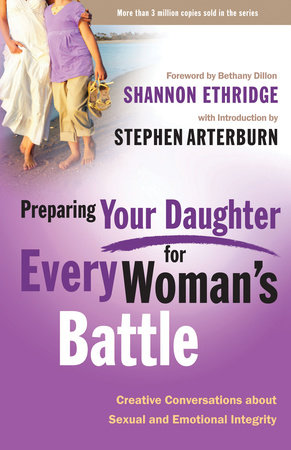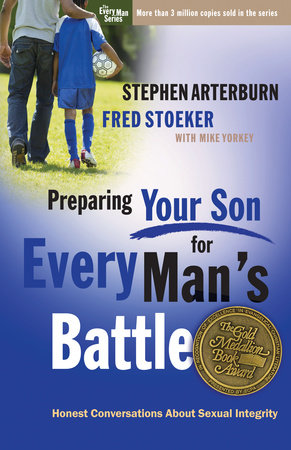Excerpt
Preparing Your Daughter for Every Woman's Battle
“ p i c k m e ! p i c k m e ! ”
Men and women who have lived wisely and well will shine brilliantly, like the cloudless, star-strewn night skies. And those who put others on the right path to life will glow like stars forever.
Daniel 12:3, msg
If you ever watched the sitcom
Welcome Back, Kotter, a situation comedy from the seventies, you’ll recall the nerdy Arnold Horshack. He was the short, curly headed “sweathog” who responded to Mr. Kotter’s questions by impulsively waving his arm in the air yelling, “Ooh! Ooh! Pick me! Pick me!” If I remember correctly, Mr. Kotter would usually succumb to Arnold’s plea and call on him to answer the question because he was such an eager student (and because no one else in the class seemed to know much!).
Wouldn’t it be great if our kids always called on
us, their parents, for answers to their questions about sexuality because they knew we were not only willing but
eager to answer? And because they felt like no one else knew as much about the topic as Mom and Dad? Does your daughter see a “Pick me! Pick me!” attitude in you, or does she see an “Oh, my gosh, I can’t believe you asked that question!” attitude?
When your daughter is ready to talk about sex, who will she go to? Will she feel free to come to you?
RE S E A RCH PROV E S YOU HOLD THE KEY
Many studies have been conducted on the value of parent-directed sex education. Consider these findings:
• Frequent sex-education talks between parent and child can greatly improve family communication and strengthen family bonds. When sexual issues can be discussed naturally and with openness and honesty, the anxiety and awkwardness that usually accompanies the topic can be reduced or perhaps even eliminated. When children can ask their parents anything about sexuality and use whatever words they need to use to convey their questions, it fosters an atmosphere of trust and respect, which can help parents and teens discuss other sensitive issues as well.1
• Both children and parents consistently report that they want parents to be the primary source of sexuality education. When parents are the main source of sex education, children are less likely to be sexually active, they positively identify with parents’ traditional sexual values, their first sexual experiences occur at a later age, and the probability of promiscuity is lowered.2
• When parents talk to and affirm the value of their children, young people are more likely to develop positive, healthy attitudes about themselves. This is also true when the subject is sex. Research shows that positive communication between parents and their children can help young people establish individual values and make healthy decisions.3
While most parents
say they want to be the ones their children come to, this rarely happens.
WHO’ S AT THE TOP OF HER L I S T ?
Various studies have documented a significant difference between the frequency with which parents said they
should be primary in providing this information and the frequency with which they reported they actually
were the primary resources. In a survey of more than one hundred thousand parents, 96 percent felt that children should learn about sex from their parents. Yet when asked from whom they thought children actually received information about sex, only 24 percent of the respondents felt it was parents.4
Sadly, most kids don’t place their parents very high on their lists of askable adults. If that’s the case, then who is at the top of the list? Teens most often report that their primary source of sexual information is their peers. But this presents three major problems: (a) peers are notorious for being sources of sexual misinformation, (b) it is often very difficult to dispel the sexual myths that are pervasive among adolescents, and (c) peers will likely promote the adoption of sexual values that are contrary to parental values, thus promoting family conflict.5
So what can a parent do? How can we ensure that we are the ones our kids turn to when they have questions about sexual issues? Part of the answer lies, I believe, in understanding the reasons why kids don’t come to their parents when they have questions about sex.
WHY KI D S DON’ T TALK WITH TH E I R PARENTS ABOUT SEX
Over the past decade, I’ve talked with kids about why this is so. Here are the three reasons I hear most often, along with my response about what parents can do to prevent their own kids from feeling this way.
1.
It’s just not talked about in our house. Obviously if we as parents don’t bring up the topic, our kids are not about to. As adults, we set the pace and tone for what conversation topics are acceptable in our homes and what topics are taboo. If your daughter has never asked you any questions about sex, this could either mean that she has not thought about sex at all yet (which is unlikely) or that she doesn’t feel comfortable bringing it up. Even if sex is considered an off-limits topic in her mind, you can still establish your home as a safe haven for such discussions by using the second section of this book with her (and
Preparing Your Son for Every Man’s Battle with your son).
2.
I’d never ask my parents about sex because they’d freak out and suspect I wanted to do it or that I’m already having sex when I’m not. Freaking out over curious questions definitely disqualifies us from the “Pick me!” parent category. If we can accept that kids have a natural curiosity about sex and sexual issues, we can calmly discuss our daughters’ questions without going into panic mode. When she brings up the subject, whether it’s about her own questions or about what she’s observed in someone else’s life, don’t be too quick to comment. Ask questions. Ask how she feels about what she’s seen or heard. Once you’ve listened to her opinions, she’ll be more open to receiving yours.
3.
My parents don’t have sex, so they probably don’t know much more than I do. Do a double take at that statement if you need to, but believe it. Many young people tell me that their parents don’t have sex. Of course, I chuckle under my breath and ask, “How do you think you got here?”
Teens usually see the humor in this and go along by saying, “Well, okay, they’ve had sex three times because I do have a brother and a sister, but other than that, they
don’t have sex!” Then I get serious and ask, “What gives you that impression?” Most respond, “They don’t even go on dates or hold hands or kiss! What makes you think they have sex?” Ouch.
We can learn a significant lesson from what our kids say about our marriages. Children associate sex with romance and affection, and if they are not seeing that in the living room or the kitchen between Mom and Dad, they can’t imagine that anything would be going on in the bedroom. I recommend that you intentionally model tenderness and affection in healthy, appropriate ways in front of your daughter so she grows up knowing marriage is a relationship she can look forward to with hand-holding, kissing, sex, and all. (We’ll talk about this in chapter 3 of book 2 for parents and daughters.)
In light of that last comment, you may wonder,
What gives kids these impressions? I have a couple of theories.
HOW DI D WE GET HE R E ?
First of all, remember that most kids learn about sex from their peers. This hasn’t always been the case. Decades ago families were living all together in one-room cabins where kids were only separated from their parents’ sexual relationship by a curtain or perhaps a makeshift wall. But today we have multiple walls and doors shielding our children from any knowledge whatsoever of our private activities. Kids also lived on farms where animals were having sex and giving birth right before their eyes. Most children knew all about sex and reproduction before they could learn to read and write.
Their other primary source of information about sex comes from the media, which glamorizes premarital sex and makes a mockery out of fidelity in marriage. If kids grow up watching much television at all, they quickly get the impression that good sex is only to be had between young, beautiful, single people. Many shows portray married couples as bored or so consumed with work and kids that passionate moments are few and far between. I’ve had many young people tell me they aren’t sure if they want to get married because they fear their sex lives will shrivel up to nothing, like most married couples’ sex lives. Ouch again.
We’ve got to turn the tide, not just in our culture, but in our own children’s minds. We must be the first ones to educate our children about sex, letting them know it’s a pleasurable part of a healthy marriage, before anyone else instills values contrary to those we as Christian parents hold dear.
THE OTHER S I D E OF THE S TORY
Unfortunately, some parents are hesitant or even afraid to discuss sexual issues with their children. Why? Here are the most common reasons I hear from parents, along with my responses:
My Child Is Too Young for This Discussion
Traditionally, many parents have attempted to seize an isolated opportunity to have “the talk” about “the birds and the bees” prior to their child’s first dating experience. This talk is usually just a plumbing lesson about where babies came from so premarital pregnancy can be avoided. Then perhaps the same-sex parent would fulfill the expectation of giving a more in-depth talk about how to have sex just before the wedding night.
I propose that if this is still our approach to sex education with our children, we may as well be asking
them questions, because they’ll know almost as much about sex (if not more) than we do if we wait that long! Consider the following passage from a textbook titled
Human Sexuality:
Determining the appropriate age for discussions about sexuality can be problematic for many parents. One study found that when asked about the age at which children should learn about sexual topics, parents of young children inevitably suggest an age later than their own child’s present age. In other words, when it comes to sex, whatever age their child is, it’s not old enough. Those parents who wait until their child reaches puberty to have the “big talk” about sex will probably find that they are repeating information that their child already knows.6
In case you didn’t catch the author’s recommendation, allow me to reiterate. As parents, we need to be talking with our children about sexuality even
before puberty! Consider these statistics:
• Twenty percent of girls and 30 percent of boys have sex by age fifteen.7
• More than 50 percent of seventeen-year-olds have had intercourse.8
• Eighty percent of teens have had intercourse by age nineteen.9
• Almost one million teen pregnancies occur each year in the United States. Thirteen percent of all births in the United States are to teenage mothers, making the U.S. teen-pregnancy rate one of the highest in the developed world. About 78 percent of teenage pregnancies are unintended, and 22 percent are intentional.10
• Of the forty thousand new cases of HIV each year, half of those diagnosed
are younger than twenty-five years of age.11
I realize these findings reflect the lifestyles of older teens, not prepubescent girls. However, I believe one of the biggest contributing problems to our teen pregnancy and sexually transmitted disease epidemic is that few abstinence programs address the early adolescent age group.12Most pregnancy-prevention programs target adolescents between the ages of thirteen and seventeen (grades eight to twelve). I believe that’s too late, as many of these young people have already begun to engage in behaviors that endanger their health and put them at risk for adolescent pregnancy. Could these kids have made healthier choices if they had experienced quality sex education much earlier in life? I believe the answer is yes, most of them could have. It may be too late for them, but hopefully it’s not too late for your daughter. Even if you’re thinking you might be a little late getting started, don’t panic. There’s no time like the present to begin these creative conversations that you’ll be reading together in the second section of the book.
Many experts recommend that sex-education programs begin between the ages of eight and fourteen, preferably at the younger ages on the continuum, in order to maximize the opportunity of reaching early adolescents when they are more open to parental influence. As parents, we need to embrace the research that supports the fact that communication about sexuality
will not increase the chances that our children will engage in sex.13
I Don’t Want to Rob My Child of Her Sexual Innocence
with Too Much Information
Consider for a moment the huge difference between innocence and ignorance. One is a state of heart, the other a state of mind. Educating her mind about this wonderful gift that God has given her doesn’t remove the innocence that is in her heart, nor will healthy knowledge tarnish her sexual purity. If anything, her heart will be all the more pure because she will have a better understanding of God’s plan for her sexuality. Scripture says we are to be shrewd as snakes
and innocent as doves (see Matthew 10:16), meaning we can be
both knowledgeable
and pure at the same time.
On the flip side, a lack of knowledge does not equate to innocence, but rather ignorance. I know many young people who are ignorant of sexual matters, yet guilty of crossing many sexual boundaries. The Bible says it’s a lack of knowledge that causes people to perish (see Hosea 4:6), and I believe that when it comes to sex, this is especially so.
Children deserve honest, age-appropriate answers as soon as they are old enough
to begin asking such questions such as:
• “Where do babies come from?”
• “How do they get in their mommy’s tummy?
• “How do they come out?”
• “Why don’t I have a penis like my baby brother?”
Talking About Sex with My Child May Awaken Her Sexual Desires
Keeping your daughter in the dark won’t protect her from having sexual struggles of her own. If anything, ignorance and confusion will only exacerbate these issues. We must remember that humanity and sexuality are inseparable. While parents may want to avoid specific details (sexual positions, frequency, and so on) we need to cover enough information to give our children a strong foundation of sexual understanding. I believe a lack of healthy information drives children to unhealthy sexual behaviors, such as inappropriate voyeurism, habitual masturbation, seduction, pornography, and promiscuity.
Be careful not to confuse being “sexual” with being “sexually active.” Just because your daughter isn’t sexually active doesn’t mean she is not a sexual being. Sexual desires are eventually awakened in all human beings, whether or not anyone ever talks to them about sex. We aren’t created with an “on” switch that gets flipped when we have our first conversation about sexual issues. We are born with an instinctual curiosity about our own bodies and the bodies of others, both male and female. That is why toddlers’ hands frequently venture into their diapers and why “playing doctor” is a common childhood game. By nature children are curious and want answers to their unspoken questions about sexuality. If parents aren’t providing these answers, our children may go searching for them in dangerous ways.
I’ve Tried, but My Child Doesn’t Want to Talk with Me About Sex
Although children may not beg their parents to talk about this topic, nearly seven out of ten teens (69 percent) agree it would be easier for them to postpone sexual activity and avoid teen pregnancy if they were able to have more open, honest conversations about sex with their parents. The same percentage also say that they
are ready to listen to things that parents thought they were
not ready to hear.14
So even if you don’t get direct questions from your daughter, don’t mistakenly think that she isn’t interested in what you have to say. Children may mask this interest out of embarrassment, perhaps even going to the extent of placing their hands over their ears and singing a silly song such as “Watermelon, cantaloupe! Watermelon, cantaloupe!” to drown out any parental attempt at candid conversation. What children are really saying by such overt behavior is,
I’m really embarrassed about this conversation because it just feels awkward to me!
We can overcome this obstacle by making such conversations much more commonplace, allowing familiarity to develop and a sense of comfort to evolve slowly and naturally. You won’t get this level of comfort by shutting up and assuming that it’s just not the right time to talk about sexual issues yet. Any time a parent brings up the topic of sex after a long period of silence, it’s likely going to feel awkward and therefore embarrassing. That’s why frequent discussions are key to keeping the ice broken between parent and child about this sensitive topic.
My Child’s School Has a Great Sex-Education Program;
I’ll Just Let Them Handle It
Some parents rely on the schools to educate their children through a health or sex education class because they don’t feel comfortable talking about these issues. But it’s important that parents view sex education in schools as merely supplemental to parental efforts. While many schools teach mechanics and safety, they likely overlook Christian sexual values. If your child’s school has a program that educates both parents and children simultaneously, this is a preferred model over taking the sex education out of the family altogether, but your participation is still vital in such programs. In one study, adolescents who completed program-related assignments with their parents reported that they communicated more often with their parents about sexual issues, expressed stronger beliefs supporting abstinence, and had firmer intentions to remain abstinent than others who did not have parental involvement in the program.15
Other parents may rely on the church’s youth pastor to instill Christian sexual values, but that’s not very effective either. Why? Just think of the plethora of topics that your youth pastor is expected to cover with your church’s teens–salvation, discipleship, evangelism, Old Testament history, New Testament principles, missions, and stewardship, along with a boatload of other social issues such as drinking, smoking, drugs, and so on. How much time can actually be devoted to the topic of sexuality?
Also consider who your child spends more time with. How much time does she spend at church? Two or three hours each week at best. How much time does she spend in a health teacher’s classroom? At the most one hour per day a few days each week for up to one year, and think of all the topics they have to cover in that short amount of time. But how much time does your child spend at home? The vast majority of it. And how much time do you have with your child? At least eighteen years. Are you getting the picture? As parents, we hold the key to giving our children the sex education they really need. Not peers. Not schools. Not churches. Parents.
I Don’t Want to Answer My Child’s Questions About My Own Sexual Choices
This is a valid concern for many parents. Who of us wants to confess our sexual struggles to our own children, especially if our lives are no examples for them to follow? If you have sexual skeletons in your closet, it may help to know that your daughter most likely isn’t going to ask you blunt, personal questions. Most children have a sense of what’s okay and not okay to ask a person, so don’t feel that you can’t begin talking to them about sexual issues until they are ready to hear all about your past failures.
With that said, I want to encourage you to examine your past failures in a different light. I think we can use these instances where we failed to guard our own minds, hearts, and bodies from sexual compromise to actually help our children. They don’t need us to be “rocks” as much as they need us to be real. I’m not saying we shouldn’t be strong and set good examples whenever possible, but when we communicate openly and honestly about the struggles we faced at their age, we are telling them, “I know where you’re at, and I remember how it feels to be there!” We assure them that they are not alone in these struggles and that sexual temptations are common to all people, including moms, dads, and young daughters. Our daughters need to know we can give them the grace to be human, that God’s mercy is unending, and that our love for them is unconditional. Finally, by being open about our experiences, we are setting the stage for them to feel comfortable coming to us with their questions, concerns, and personal struggles. Isn’t that the goal?
A word of caution: keep in mind that personal confessions need to come at an appropriate season in your daughter’s life and should only be revealed for her benefit. Several months ago a woman e-mailed me to ask, “Do you think it’s okay if I want to confess to my daughter that I had an abortion when I was a teenager?” I asked her how old her daughter was and what was motivating her desire to bring this out into the open. If she had said, “She’s eight and I just want to get it off my chest!” I would have encouraged this mom to refrain from such a confession because her motivation would have been selfish and her child would more than likely not have been mature enough to handle that kind of information. However, this mother responded, “My daughter is seventeen and dating a boy very seriously. I just want her to understand that unplanned pregnancy can happen to anyone so that she’ll make wise choices and save sex until marriage.” This mom was ready to humble herself for the sake of saving her daughter from future pain. I encouraged her to go with her conscience, and that if she felt confessing her abortion would ultimately benefit her daughter more than keeping it from her, such would be an honorable thing to do.
Just in case you are still wondering whether you should be talking with your eight- or nine-year-old about sex, let me tell you why my husband and I are so glad that we talked to our kids about sex at an early age.
OUR OWN SIGH OF RE L I E F
A few months before Erin started kindergarten, I heard Dr. James Dobson say on the radio that before kids go off to public schools, they need to know the truth about where babies actually come from. I talked with my husband, Greg, and we both agreed that we wanted to put a filter in Erin’s mind through which all sexual talk could be sifted and sorted into categories of
fact or
fiction, and
appropriate or
inappropriate. So we told her as much as we felt she could handle at her age.
Within the first few weeks of school, Erin told me that a little boy pulled down his pants on the playground and was showing his penis to everyone. I asked, “Honey, what did you do when Jack did that?” She replied, “Mommy, I turned away. Everyone else was looking, but I knew what Jack was doing was wrong, so I didn’t look.”
Whew! Even though I would not have punished her for looking out of curiosity, I was glad Erin chose to look away even when I wasn’t there to govern her behavior.
Less than a year later, another more serious situation came up. Erin came home from first grade, obviously bothered by something. Later that evening we were reading in the book of Genesis and came across the story of how Lot’s daughters lay with their father to get pregnant by him. After I finished that story and explained why it is wrong for relatives to be sexual with one another, Erin asked if she could tell me a secret. She said that during recess, a friend whispered in her ear, “Sometimes I go in the closet with my cousin, and he makes me put his weenie in my mouth.” My heart sank, but I knew I couldn’t ignore the situation. I asked, “Erin, if we invite your friend over, would it be okay with you if I talked to her about this?” Erin said she wished that I would.
A few days later, Molly came over. I struck up a conversation about how I was a youth pastor and that sometimes young people have secrets they need to share with adults. I assured her that if she had a secret, I was someone she could talk to about it. Erin told Molly she had let me in on her secret. At first, of course, she was embarrassed. But I explained that what her eleven-year-old cousin was forcing her to do was wrong, and that her mother would really want to know. Molly replied, “Oh, I could
never tell my mama! But Mrs. Ethridge…
you could.” Days later I was explaining to this mother that her nephew was sexually abusing her daughter. She was horrified but admitted she had been suspicious. With a difficult family meeting at her house with her sister and nephew, the situation was remedied.
How would Erin have responded to that situation had we not had those private, personal conversations about sexual purity? Would she have told me about what was happening to Molly? Probably not. Would she have thought this was normal if someone tried to convince her to commit a similar act? I don’t know. Could it still be happening to Molly years later had Erin not shared the secret? Perhaps. What a relief that my daughter knows she can talk to me about things such as this. I tell you this story not to shock you, but to encourage you. Be the first one to talk to your daughter so you can write your sexual values on her heart. If you’ve already missed that opportunity for whatever reason, ask questions to find out what she has already learned and help her sort fact from fiction. Let’s be “askable” parents with “Pick me!” attitudes. We can be the generation of parents who move from anxiety to authenticity so our children can learn how to be the best stewards of God’s gift of sexuality.













